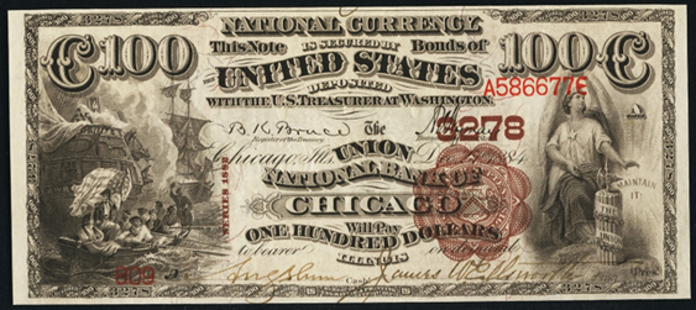One Hundred Dollar Notes › Nationals › 1882 One Hundred Dollar National Bank Notes › Michigan Charters › 1882 $100 Sault Ste Marie Michigan First National Bank
Get Value Now
| Item | Info |
|---|---|
| Series | 1882 |
| Charter | #3547 First National Bank of Sault Ste. Marie, Michigan |
| Year Chartered | 1886, 184 Banks Chartered |
| City Info | Sault Ste. Marie is a city in, and the county seat of, Chippewa County in the U.S. state of Michigan. It is situated on the northeastern end of Michigan's Upper Peninsula, on the Canada–US border, and separated from its twin city of Sault Ste. Marie, Ontario, by the St. Marys River. The city is relatively isolated from other communities in Michigan and is 346 miles from Detroit. The population was 14,144 at the 2010 census, making it the second most populous city in the Upper Peninsula. By contrast, the Canadian Sault Ste. Marie is much larger, with more than 75,000 residents, based on more extensive industry developed in the 20th century and an economy with closer connections to other communities. Source: Wikipedia |
| Similar Cities | If your note doesn't match try: 1. Sault Ste. Marie, Michigan - Sault Ste. Marie National Bank |
| Seal Varieties | Brown, Blue |
| See Also | If your note doesn't match try: 1. 1882 $100 Gold Certificate 2. 1878 $100 Legal Tender 3. 1880 $100 Legal Tender |
| Other Info | 1. Value depends on notes known for charter, condition and market demand. 2. Rare and highly desirable National Note. |
| Neat Fact | Commodore Oliver H. Perry on launch during Battle of Lake Erie. Liberty to right. |
No Obligations Offers and Appraisals
Please submit a good photo or scan. It will be identified and evaluated. Understand there may be subtle differences between the image you see above and your note. Signatures, design, markings and note condition will determine the offer price. Notes in Uncirculated or better condition receive the best offers.
Appraisals can be estimated for wholesale and retail prices. Wholesale is what dealers typically pay. Retail is what a collector might pay. Retail is slightly higher in most cases.
Please visit this page for USA Paper Money Reference. Do not treat this page as a reference guide, it is for appraisal and acquisition purposes only.
